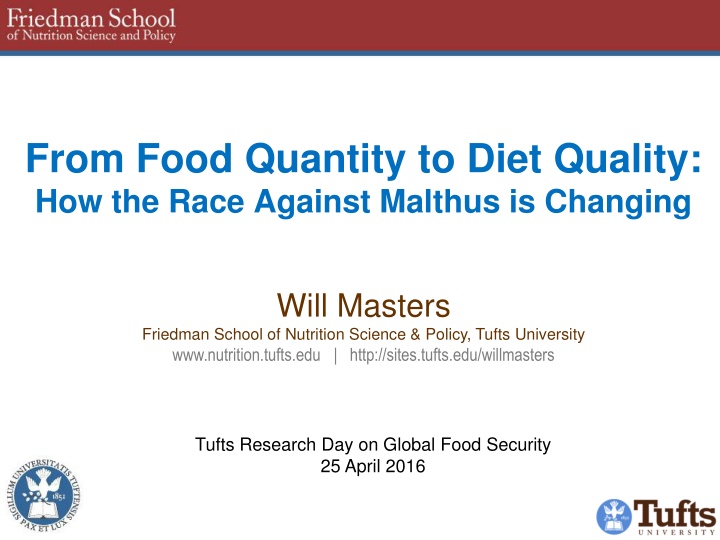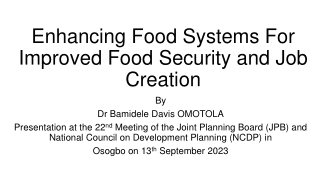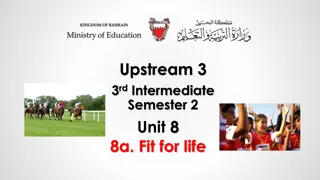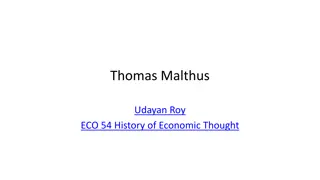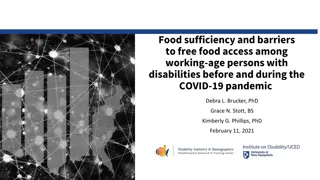Race Against Malthus: Changing Food Systems Dynamics
The race against Malthus shifts focus from food quantity to diverse, yet not always healthier, foods. The dynamics of rural population growth in regions like South Asia and Sub-Saharan Africa present contrasting trajectories. While South Asia's rural population is expected to peak and decline post-2028, Sub-Saharan Africa's rural population growth is projected to continue past 2050 despite urbanization trends. This shift in food system strategies highlights the evolving challenges in ensuring food security and nutrition quality in a changing global landscape.
Download Presentation

Please find below an Image/Link to download the presentation.
The content on the website is provided AS IS for your information and personal use only. It may not be sold, licensed, or shared on other websites without obtaining consent from the author.If you encounter any issues during the download, it is possible that the publisher has removed the file from their server.
You are allowed to download the files provided on this website for personal or commercial use, subject to the condition that they are used lawfully. All files are the property of their respective owners.
The content on the website is provided AS IS for your information and personal use only. It may not be sold, licensed, or shared on other websites without obtaining consent from the author.
E N D
Presentation Transcript
From Food Quantity to Diet Quality: How the Race Against Malthus is Changing Will Masters Friedman School of Nutrition Science & Policy, Tufts University www.nutrition.tufts.edu | http://sites.tufts.edu/willmasters Tufts Research Day on Global Food Security 25 April 2016
Last week, more bad news from Africa: Also, this:
The race against Malthus is changing as commodities get cheaper and population growth slows down We are here (approx.) 1800 1850
The race against Malthus is changing from more food to more diverse foods Source: Calculated from FAO Food Balance Sheet data, faostat3.fao.org/download/FB/FBS/E
...but not always healthier foods Source: Calculated from FAO Food Balance Sheet data, faostat3.fao.org/download/FB/FBS/E
...and diverse trajectories over time Source: Calculated from FAO Food Balance Sheet data, faostat3.fao.org/download/FB/FBS/E
The food systems race against Malthus runs through rural population growth South Asia's rural population will peak and decline after 2028, due to fertility decline Globally, the whole world's rural population is already near its peak and will soon decline 10.0 2.50 Total Total 9.0 2.25 Rural Rural 8.0 2.00 Urban Urban 7.0 1.75 6.0 1.50 1.25 5.0 1.00 4.0 0.75 3.0 peak rural is 2022 0.50 2.0 0.25 1.0 0.00 0.0 Source: Calculated from UN World Urbanization Prospects, 2014 Revision. Released July 2014 at http://esa.un.org/unpd/wup.
The most delayed demographic transition is in Sub-Saharan Africa Sub-Saharan Africa's rural population will keep growing past 2050, despite rapid urbanization Globally, the whole world's rural population is already near its peak and will soon decline 10.0 2.50 Total Total 9.0 2.25 Rural Rural 8.0 2.00 Urban Urban 7.0 1.75 6.0 1.50 5.0 1.25 4.0 1.00 3.0 0.75 peak rural is 2022 2.0 0.50 Rural still 1.0 0.25 rising past 2050! 0.0 0.00 Source: Calculated from UN World Urbanization Prospects, 2014 Revision. Released July 2014 at http://esa.un.org/unpd/wup.
Despite its fast-growing cities, Africa is the last frontier of Malthusian rural population growth Sub-Saharan Africa's rural population will keep growing past 2050, despite rapid urbanization 2.50 Total 2.25 Rural 2.00 Urban 1.75 1.50 1.25 1.00 0.75 0.50 Rural still 0.25 rising past 2050! 0.00 1800 1850 Source: Calculated from UN World Urbanization Prospects, 2014 Revision. Released July 2014 at http://esa.un.org/unpd/wup.
The race against Malthus is changing In English language books, hunger declined after 1945 but rose again after 2005, obesity rose in 1970s and since 2000 1800 1850 Source: Google Books ngram viewer, https://books.google.com/ngrams/graph?content=hunger,obesity& year_start=1900&year_end=2015
